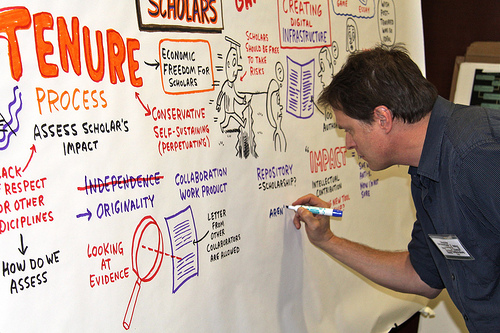Doctoral Thesis Defense

Matilde Martínez, PhD candidate in Innova Institute, will present her thesis defense on Friday, Feb. 13, at 10:30 a.m., in Sala de Graus, Sant Josep building.
The title of her thesis is “Improving Creativity Training: An examination of the effects of delivery method and problem realism on creative performance in post-training ideation”.
Along this two-chapter entries we will look at the dissertation´s abstract. The first part introduce us to the research problem and states the purpose of the work. In part two, that you will find in the next entry, we will learn about the thesis experiments, its findings and implications.
Let’s start then with part one:
Some rights reserved by Norman Lear Center
Creativity has attracted increasing interest over the past seven decades. Scientific researchers from numerous academic fields as well as business managers, creativity practitioners and educators, are all interested in the subject of human creativity, its stimulators and inhibitors. Such interest is based on the belief that creativity is a motor of innovation, a key factor in future development of humanity. It is thus also believed that if we are able to understand the underlying factors that enhance human creativity we can design training programs to help employees and future generations to reach their full creative potential to the benefit of the entire humanity.
The purpose of this dissertation is to examine the effect of training on creative performance. Training has been long indicated to have the potential of enhancing creative abilities. As result many creativity training programs have been developed by organizations and educational institutions alike (Sawyer, 2006). Yet, the empirical evidence regarding the effectiveness of creativity training programs is limited to few such programs. Rather than being focused on the effectiveness of specific training programs this dissertation is centered on the effect that the delivery format may have on the creative performance of groups that have received creative training. This way the researcher seeks to ascertain whether the way in which creativity is taught to trainees affects post-training creative performance. Specifically this study examines the effect of two such formats namely lecture-based training versus an experiential-learning approach. In addition, the study also examines the effects that the type of problem (real-life versus fictitious) may have on creative performance.
